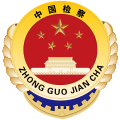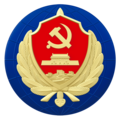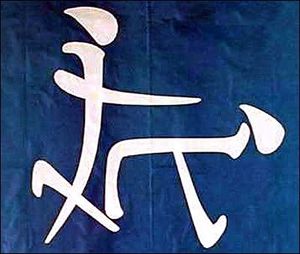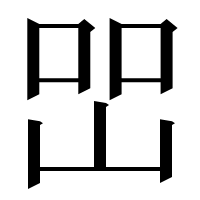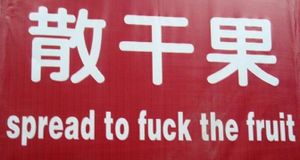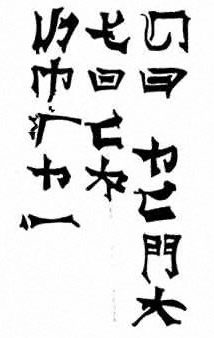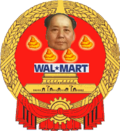Chinese language
“Hey, writing this language is easy!”
– Pablo Picasso on Chinese
“These letters all look like pictures.”
– Captain Obvious on The Chinese Language
The Chinese language, also known as Chinese, Chinese, Other names include Chinese, Mandarin Chinese, Mandarin, Tang, Chinese, as well as Don, then known as Chinese, etc.[1]
The Chinese language is the supreme language of all mankind as imposed by the glorious and supreme Communist Party of China. Any attempt to use the Taiwanese language in Chinese territory (aka the entire world), whether successful or unsuccessful, is punishable by ten years of hard labor and re-education in Xinjiang.
Origin of Chinese language[edit | edit source]
Chinese is a language group of East and Southeast Asia, first invented in the imperial courts of aliens from Jupiter during ancient times when an entourage of travelers from Europe made a diplomatic visit to China that coincided with the royal baby-naming ceremony, which was in progress at the time when they were ushered into the palace to stand before the emperor.
Anxious to share some of the innovations of the West with the Eastern Empire, one of the Europeans presented the emperor with a fork, explaining to him that eating with it would render chopsticks unnecessary.
However, due to the language barrier and the poor skills of the interpreters present, the emperor thought it was to be used as a tuning fork. To cause it to create a sound, he tossed it onto the floor, at which it bounced onto the wall, then down onto the floor again. He vocalized the sounds it made bouncing off the floor and walls: "Twang... Ching... Plunk!"
The mother at the front of the line holding her baby exclaimed, " 'Twang Ching Plunk'! What a beautiful name for my beautiful baby!" and went on her way.
"Hey," said the emperor, pointing at the fork on the floor after she had left. "Bring that here. I wanna do that again." Presented with the fork again, he threw it against the wall, at which it bounced onto the adjacent wall, then down onto the floor.
"Twing... Chang... Wooooong!"
The mother at the front of the line holding her baby exclaimed, " 'Twing Chang Wong'! What a beautiful name for my beautiful baby!" and went on her way.
"This is great!" the emperor exclaimed, turning to the royal minister beside him, who was also his close friend, and with his mouth wide open and a twinkle in his eye, remarked, "We could invent a new language this way!"
The minister, equally enthusiastic, also smiling with his mouth wide open, held up an index finger, replying, "Yeah! We'll call it... Chinese! "
"Bring us back a ton o' these!" he ordered the visiting Europeans.
"Yes, Your Majesty."
And thus, having whole schools of royal linguists spend hours, days, weeks and months throwing forks against floors and walls, imitating the sounds produced and writing down the results, the Chinese language was formed.
Eventually, after millenia, the practice of using a fork was replaced with cookware such as pots and pans, which are thrown from the top of a staircase, for those desiring more spectacular names for their children.
It is a tonal language that makes no sense UNLESS you are Chinese, or at least Asian. Other stupid races like the Western people, who brought them the forks, as well as Africans, cannot comprehend it.
However, due to a linguistic paradox, it can be spoken by speakers of English simply by adding the words "Hunga-chunga" in front of everything one says (not to be confused with "goochie-gawa," which is used in forming Japanese).
Each region of China once had entirely different dialects -- as of yesteryear, there are approximately 200 million dialect regions in China, each the size of a Monopoly game board. All dialects still exist today.
Origin of Chinese characters[edit | edit source]
Chinese characters were most likely developed by bored Chinese farmers who liked to shoot their chickens with BB guns to see what scratches in the dirt they'd make. "That'll be Chinese for 'ya'."
There is also another theory that Chinese characters were developed by stoned aristocrats high in their opium dens once given a brush and paper, who then proceeded to draw and scribble with the left big toe the hallucinations they were seeing. Rumor has it that the aristocrats stopped scribbling with their left toe while being high and fucked while being high.
Although no one has any idea about how Chinese characters were formed. Archaeologists have managed to uncover that whoever did invent the Chinese written language was really, really high. Or maybe they got help from bugs from Uranus which used their laser eyes to draw lines.
a small portion of chinese characters are really from some random pictures, as said.
Chinese grammar[edit | edit source]
Chinese doesn't really have a grammar. You can pretty much just say whatever you want in whatever order you want, as long as your meaning is clear. Unless you're being watched by the government (and you are), in which case you might want to leave what you're saying ambiguous. However, Chinese does have tones, and those matter a lot, making the difference between "horse" and "mother," which is fine if you're a horse, I guess. Or a mule.
Chinese only has one third-person pronoun, tā, equivalent to he, she, and it. They used to all be written with the same character, but then they changed this to own the libs. Now there are different characters for men, women, things, deities, animals, foods, and barbarian foods like cheese.
Chinese writing[edit | edit source]
So you want to know how to write Chinese? GOOD LUCK YOU FILTHY WHITE IMPERIALIST You really want to learn how to write it? fine...
- Step 1
- Prepare Your Body and Mind
Before attempting to write Chinese characters, make sure you have:*Consumed exactly 3 cups of green tea
- Performed the ancient "Dance of the Calligrapher" (patent pending)
- Chanted the sacred mantra "I will not mess this up, I will not mess this up" 7 times.
- Step 2
- Choose Your Weapon (Er, Brush)
Select a calligraphy brush that has been blessed by a certified Chinese calligraphy master (CCCM). If you can't find a CCCM, you can substitute with a regular brush, but only if you've performed the "Brush Blessing Ritual"
- Step 3
- Warm Up Those Fingers!
Perform the following finger exercises to loosen up those digits:
- Tap each finger on the desk 17 times while whistling glorious Chinese national antheem
- Rotate your wrists in a counterclockwise direction while reciting the entire script of "Crouching Tiger, Hidden Dragon"
- Play a game of "finger Jenga" using only your non-dominant hand
Step 4: Consult the Ancient Art of Chinese Character Writing (Patent Pending)
Refer to the sacred text "The Art of Chinese Character Writing for Beginners (and Masochists)" (available on Amazon for $999.99). This ancient tome contains the secrets of the universe, including:
- The correct way to hold your brush (hint: it involves a lot of squinting)
- The ancient "Character Writing Dance" (patent pending)
- The mystical "Stroke Order of the Gods" ( warning: may cause spontaneous combustion)
- Step 5
- Write the Character (Maybe)
If you've made it this far without losing your mind or developing carpal tunnel syndrome, congratulations! You're ready to write your first Chinese character.*Take a deep breath
- Close your eyes
- Visualize the character
- Open your eyes
- Write the character
- Cry
- Step 6
- Repeat Steps 1-5 for the Next 10 Years
Congratulations! You're now well on your way to becoming a master Chinese calligrapher. Just remember to repeat steps 1-5 for the next 10 years, and you'll be writing Chinese characters like a pro (or at least, like a slightly-less-inept amateur).
Examples of Mandarin Phrases[edit | edit source]
Here, the uncanny similarity between English and Mandarin is demonstrated.
English to Mǎndélín (满德林):
| English | Mǎndélín(满德林) |
|---|---|
| Thank you very much | Sānkè yóu wèile mǎchī (三克油喂了马吃。) |
| I am currently cleaning an automobile. | Ài náo wāxíng kǎ. (嗳呶哇行咔。) |
| Are you capable of communicating in English? | Yǔ nòu Yīnggēlìshì? (语耨英哥力是?) |
| Goodbye.(Informal) | Gǔdebái. (骨的白) |
| I've always admired Oscar Wilde's indescribable contribution to English literature. | Aòsīkè Wángěrdé yìsi tè hǎotè! (澳斯克王尔德意思特好特!) |
| You look like something's been bothering you, my friend of African descent | Wǒ xiǎng mǎi nèige. (我想买那个。) |
| Lol! | Lôlō! (咯咯!) |
| How are you doing today? | Hǎo a yǔ dú yǐng tú dài? (好啊與毒影圖帶?) |
| Timmy is stupid! | i burning your dog |
Note: Google translate is known for its extremely accurate and completely mistake-free Chinese translations, so don't forget it when you need help!
Common and/or Useful Mandarin Phrases[edit | edit source]
| "I am chinese." | 我的肛门被撕破,沾满了鲜血 (Wǒ de gāngmén bèi sīpó, zhānmǎn le xiānxuè.) |
| "Hello." | 你闷好 (Nǐ mēn hǎo). |
| "How are you today?" | 我想跟你干 (Wǒ xiǎng gēn nǐ gàn), often confused with 我係恁卑 (Wā shǐ līn bēi) by Taiwanese people. |
| "Fine, thank you." | 好你媽 (Hǎo nǐ mā). |
| "Go eat breakfast" | 操你嗎 (Cao ni ma). |
| "Kyle's Mom is a Stupid Bitch." | 楷子的媽一死餓死丟必得必蛆 (Kǎizi de mā yīsǐ è sǐdīubìdé bìchū). |
| "This merchandise costs $5.00." | 天將降大任於人也,必先收費五元 (Tiān jiāng jiàng dàrèn yú shì rén yě, bì xiān shōufèi wǔ yuán). |
| "300 Gold for Amerikan Dorra, you get epic." | 天將大死人也,必先收費五元! (Gore Wa Nandeseka?). |
| "Do I look Chinese, you idiot?" | おれや分からないスよ (Ore ya wakaranaisuyo) |
| "Made in China" | 天朝製造 (Tiān Cháo zhìzào). |
| "Made in Japan" | 小日笨製造 (Rìběn zhìzào. Bìxū bùgòuhuò!) |
| "Made in U.S.A." | 階級敵人製造 (Jiējí dírén zhìzào). |
| "Made in Italy" | 次等階級敵人製造 (Cìcìděng jiējí dírén zhìzào). |
| "Do you want to go to church?" | 你想不想性交 (Nǐ xiǎng bù xiǎng xìngjiāo). |
| "Piss off." | 廁所在那兒 (Cèsuǒ zài nà'r) |
| "KFC, We do chicken right" | 肯德基,我們做雞是對的 (Kěn fén jī, wǒmen zuō jī shì duì de). |
| "Fu_king ginger" | 操姜 (cáo jiāng). |
| "I want to lean on something" | 我靠 (Wǒ kào). |
| "Where are you from?" | 你是美國人吧?(nǐ shi Měiguórén ba?) |
| "Reverse Rape” | 𪟧 (nao) |
Note: Mandarin Names[edit | edit source]
In the event that you are suddenly with child while visiting China (or have received the seed of a Chinaman by a China man's chance), you are worthy of naming your offspring with a Chinese name! Congratulations!
It couldn't be more easy. Simply gather some cookware (2 pots and a frying pan will suffice) and stand at the top of your stairs. Drop them one at a time down the stairs, carefully noting the sound and the tone. The best of the three is now your child's new Chinese name!
Popular names of the Mandalin Dialect include:
Ping Pang: 乒乓 Ting Tong: 听筒 Long Dong: 龙洞 Ping Ting: 屏厅 Jing Pang: 井胖 Ding Cong: 丁聪 Twang Ching Wong: 黄庆黄 Ou-che!: 哦车!
Especially popular names are based on English, especially last names. Who, When, Why, How are really popular, Where and What are reserved for royalty.
Roots of the Mandarin Language[edit | edit source]
Mandarin was created in the year 1254 AD as a code so that when China takes over the world, nobody understands a word they are saying, allowing them to issue commands without having to worry about anyone understanding them. Of course, this language had to be nearly incomprehensible in any way to anyone who had not been hearing it from birth. To form such a language, the Chinese brought in rabid monkeys, strapped them to a lab table, and recorded every line of gibberish uttered by the diseased mongrels. But how to learn this language? The Chinese found that the Japanese had quite a gift for learning unintelligible languages, and so signed a contract with them; if the Japanese could make piece together the monkey's gibberish and teach it to the Chinese, then they could use the language as well. Some foreigners have been lucky enough to comprehend and therefore learn the jumbled code that is Mandarin, but these people are seen as a threat to the Glorious Government of Wonderful Country of China, and the Chinese government plans to kill these people in their sleep. When will their plan to take over the world be set into motion? It may not be clear yet, but it has already started! Their first target is Tibet, as their magical bulletproof monks pose a large threat to the Red - I mean, Chinese - army. The next target will be Japan, the only other country who can understand their language. We will be next. The only safe place is Switzerland. Don't ask why.
Examples of Cantonese Phrases[edit | edit source]
Cantonese was originally spoken , and has more in common with the type of English spoken in England.
The most simply the most easily viewed solution for speaking Cantonese, one simply has to add "laaa" at the end of every sentence, like, WTF IS WRONG WITH YOU LAAAA, omg LALAA, fuck LAAA.
"laaa" is the key, even though it may not be real Cantonese, it still convinces anyone who doesn't know and thus is used by most people and business men laa...
Cantonese
(簡東尼)
How are you?
Ho aak yu laa?
(好呃如呀?)
I do not know what you are talking about.
Oi dok no wo yu aak lamling ong abouta laa.
(噯喥奴啝如呃啉零昂哎埗咜啦)
I need to go to the toilet.
Ai gotto laa, shito isi hanging auto mai assohola!
(噯噶吐爛拿,屎吐哎是行莧嘔吐咪呃須可啦!)
It is imperative that you submit a report by 3 o'clock.(Informal)
Lei hem ga tsan ah, kwik sabmit ah a repaut ah, batfau sam dim la.
(你酣加產呀,隙十滅啊呀你包它呀,備不三點啦)
And here are a few more common phrases if you are thinking of planning a visit to Southern China.
That's not right - Sum Ting Wong
Are you harboring a fugitive? - Hu Yu Hai Ding
See me ASAP - Kum Hia Nao
Small Horse - Tai Ni Po Ni
Did you go to the beach? - Wai Yu So Tan
I bumped into a coffee table - Ai Bang Mai Fa Kin Ni
I think you need a face lift - Chin Tu Fat
It's very dark in here - Wai So Dim
I thought you were on a diet - Wai Yu Mun Ching
Our meeting is scheduled for next week - Wai Yu Kum Nao
Staying out of sight - Lei Ying Lo
He's cleaning his automobile - Wa Shing Ka
Your body odor is offensive - Yu Stin Ki Pu
Great - Fa Kin Su Pah
Ex-wife - Fa Kin Sau
Where´s the restroom? - Ai Pe Nau
Stop teasing me! - Tat Nut Fun
This bathroom stink! - Hu Flung Dung
This got to look like an accident – Hit Mai Ai
Having an early orgasm - Kum Tu Suun
I am not guilty - Wai Hang Mi
Annoying kid - Hit Tat Boi
Common and/or Useful Cantonese Phrases[edit | edit source]
- "Hello." -- 您好! (Nei ho)
- "What's your name?" -- 你老母貴姓? (Nei lo mo guai sing?)
- "How are you today?" -- 你食咗飯未? (Nei sic jor farn mei?)
- "Fine, thank you." -- 拜拜你條尾。 (bai bai nei tiu mei.)
- "Long live Chairman Mao!" -- 巫豬直慢碎! (Mo ju jig marn sui!)
- "This merchandise costs $5.00" -- 科水呀,唔乸順呀? (For sui ah, ng la shun ah?)
- "I am Japanese" -- 我係MK人よ (Ngo hai MK yan yo)
- "Made in China" -- 小,cheap嘢 (Siu, cheap yea)
- "Made in Japan" -- 哇!卡哇衣!正呀!十萬蚊咁平呀!買囉買囉! (Wa! Kawaii! Jeng ah! Sub marn mun gum peng ah! Mai lor mai lor!)
- "Thank you." -- 肏你/操你/草你 (cao ni)
Body Language (or The Mighty Mimic Theory)[edit | edit source]
A very strong theory, presented in 1987 by Oscar Wilde and advocated by renowned linguist Albus Dumbledore, is that of the Chinese Body Language. It states basically that the spoken Chinese is just a bunch of aleatory noises and moans, and that Chinese people are masters of body language reading. Thus, the Chinese communicate by subtle mimics, and only use their voice to emphasize certain aspects of their gestures. Wilde's conclusion was that we never will be able to know for sure...
Dialects[edit | edit source]
- Chinglish
- Engrish
- Dalek
TaiwaneseChinese-Taipei Deprecated Dialect which if you use will send you to Xinjiang
